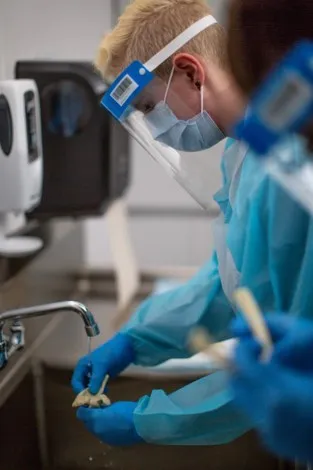A Northern Michigan University student completed summer research that could help determine the time of death in criminal investigations. Senior biology major Riley Jepkema of Kalamazoo collaborated with Forensic Research Outdoor Station (FROST) director Jane Wankmiller on the project. Jepkema received a $5,000 Anna and Rich Lundin Honors Summer Research Fellowship to conduct her research.
As part of a joint project between FROST and Western Michigan University's Pathology Department, Jepkema's summer research examined the human gut microbiome as decomposition occurs after death.
“I take swabs from the mouth and the cecum, where the large intestine meets the small intestine,” explained Jepkema. “The bacterial DNA from these samples is isolated and analyzed to determine the species' composition. I want to know how many of them are there, and when they appear and multiply.”
Jepkema hopes the study will add to the knowledge on the postmortem human microbiome and says the information is critical in solving crimes, as the bacterial community composition could be used to determine the postmortem interval, or time since death.
“As an undergrad, I probably wouldn't have had the opportunity to conduct this type of research at another university,” said Jepkema. “I came into NMU a little confused as to what I wanted, but when I began working at FROST, something finally clicked.”
Jepkema was one of five NMU students selected for Lundin Fellowships to conduct research with faculty mentors this summer. After graduating in December, she plans to attend medical school and become a forensic pathologist.
FROST is intended to advance knowledge and understanding of forensic taphonomy, anthropology, decomposition and other forensic sciences, especially as they are affected by considerable snow accumulation and repeated freezing and thawing in a high-latitude climate.

